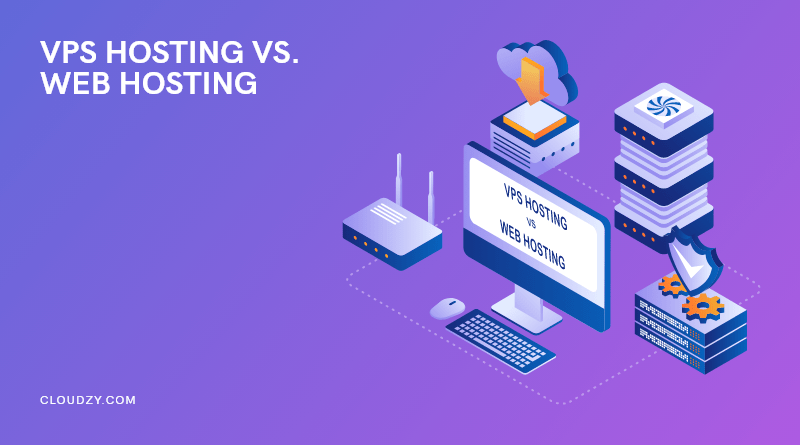Having a website is one of the most essential aspects of running any business. Doesn’t matter if you are an e-commerce business owner, a blogger, or a company; your website is the front line of your business. There are many factors that make up a good website: responsiveness, being user-friendly, minimum latency, design, and so on. But, one key factor is web hosting. The first thing you need to do is find a server to host your website. You need first-hand information on VPS vs. web hosting servers to ensure you choose the right hosting server. You can use shared hosting servers like Bluehost. You can also use a virtual private server.
Choosing a web hosting server completely depends on your website’s purposes. I know this might be a bit confusing. This blog post will help you understand what VPS and web hosting servers are, what the whole VPS vs. web hosting servers differences are, and how to pick a web host server best suitable for your needs.
What Is Web Hosting?
Every website you have ever visited is hosted on a server. Web hosting is the act of housing, maintaining, and storing files and data for websites. Web hosting servers give you the facilities you need to build your website, maintain it, and make it accessible for users online. Basically, what you do is rent or buy space on the internet for your website. It’s literally as simple as that. Choosing the right hosting server and plan means that you will have enough space and resources to build your website and support the traffic on your website to reduce downtime and prevent connection errors.
How Does Web Hosting Work?
When you buy a domain name, a web hosting server is the internet location that stores your website data like HTML, CSS, images, and text content. You can upload your whole website data from your computer on your web server. Then, when a user visits your website through web browsers, the DNS (Domain Name System) makes sure that the browser is connecting to the web hosting server that is hosting your website.
There are about ten different types of servers that offer web hosting services. Different types of web hosting servers offer different plans and recourses. To choose the right server, you need to know about the plans web hosting servers offer and what resources you need.
Let’s look at the two most common types of web hosting servers: VPS vs. Web hosting shared servers.
What Is a Web Hosting Shared Server?
Web hosting services like Bluehost and DreamHost have shared servers. A shared server is a huge server machine with a certain amount of recourses like RAM, storage, and CPU that hosts multiple websites. Basically, you will be sharing server resources with multiple other websites. Sharing a server means you also share the cost, so hosting your website on a shared server is pretty cheap and affordable. But is it worth it?
Let me give you a simple and relative example. You are looking for an apartment to rent. Based on the prices and space you need, you decide to get roommates. You have your own room, you decide on how to decorate and furnish it, and you have your personal space and privacy, but you are also sharing the living room, bathroom, and kitchen with your roommates. You don’t know these people or their habits. Sure, you are living in the calm of your own room, but they can still cause problems in the common area.
This is exactly what happens in a shared server. You don’t know who else or how many other users are hosting their websites on the same server. The problem is that if only one website takes up too much space or bandwidth or even has downtime and latency issues, it will affect your website’s performance.
Let’s get back to the apartment example. Suppose you need control over all the space in your apartment. Then, you can look for a one-bedroom place in your price range. You will have your own space, you get to furnish the whole house, and no one will cause you issues in terms of security or privacy.
This is the difference between VPS vs. web hosting servers.
What is a Web Hosting VPS?
A VPS, a virtual private server, is exactly what it sounds like. A virtual machine on a server based in any location you choose that is private to you, and you can connect to virtually from your laptop at home. You can use a VPS to work remotely from home, browse websites from a different location than your computer, or when you need stronger recourses but are not able to update your own system. There are so many more reasons to use a VPS. One common reason is web hosting.
Let’s scale up the apartment example. You are now renting your own place in a building. You still share common areas with your neighbors, but the chances of your neighbors bothering you are way less than roommates causing issues.
Using a VPS is like renting a private unit on a server. There are other people hosting their websites on the same server, but your server space belongs to you only, it is way more secure than a shared server, and all recourses provided by your own unit are specifically dedicated to you.
Hosting your website on a VPS means that no other website is taking up space from your website. It is far more secure because a malicious attack on another website cannot affect yours, and you have a certain amount of resources to build and maintain your website. Based on your website traffic and storage needs, different VPS providers like Cloudzy offer different plans.
Now that you know what web hosting VPS vs. web hosting shared servers are let me teach you how to choose the right server and plan to host your website.
Self-host your WordPress on top-tier hardware, featuring NVMe storage and minimal latency around the world — choose your favorite distro. Start Blogging
Start Blogging
How to Choose the Right Web Hosting Server
If you want to host a successful website from the start, you need to figure out what you need and evaluate web hosting server providers on the following key factors. By doing so, you can easily make a decision on which server is right for you.
-
Know what your website needs
Your very first step to getting started is to make a list of what you need for your website. Let me ask you some questions so we can figure out your website needs together:
- How large is your website, and how much space do you need?
- How much is your average expected traffic in a month?
- How much is your web hosting budget?
- Apart from storage, what other services are you seeking from a web server?
Get your pen and notepad and answer these questions. You now have a clearer idea of the specifics you need.
If your business has a specific market, then take that into consideration too. For example, if you are running an e-commerce business like an online store, it’s best to focus on bandwidth and security too. For a photography website, your essential recourses are storage and speed. One other service you need to consider is the type of customer support you need.
You also have to consider the content management system. WordPress takes up a high percentage of the CMS market. If you are using WordPress to build your website, then look for hosting server providers like Cloudzy that offer WordPress VPS plans.
-
Plan out your server contract period
When using a web hosting server for the first time, it’s best to look for providers that offer different monthly and yearly plans. If you are unsure about your commitment to the provider, you can start by testing the server for a month. So it’s important to look for a provider that is willing to sign a contract for a short period of time. You need to also go for a provider that is fluid in changing plans. Apart from monthly and yearly plans come in different prices and resources. When you are ready to update your plan in terms of time or recourses, you need a provider that will make sure you go through a smooth and fast transition.
-
Check for uptime guarantees
One of the most important factors in comparing web hosting server providers is uptime. The term “uptime” refers to the amount (in percentage) of time your website is online and accessible to viewers. Of course, no provider can guarantee that their servers and your website will be up and running all the time. But it’s important to look for the server that offers the closest uptime value to 100%. For example, Cloudzy offers an uptime value of 99.95%. This means that your website will only experience 43 seconds of downtime each day.
When you see uptime amounts like 99.9% on web hosting server websites, use an SLA uptime calculator tool to see how much uptime each provider is guaranteeing and how long your website will be offline in a day, month, and year.
-
Check out the provider’s primary features
You have already made a list of what your website needs. This allows you to know exactly what to expect from your web hosting server provider. Some hosts offer very general services, while others offer specific features that will make hosting your website a lot easier. For example, at Cloudzy, we offer WordPress VPS hosting. It’s a VPS service specifically offering the resources you need to run your WordPress website. But that’s not all. We also value your comfort, so we offer VPS for different operating systems. You can get Windows or Linux virtual private servers based on the operating system you are more comfortable using.
-
Make sure you get the support you need
Some providers offer the dream web hosting servers. But, they will go MIA or pass you around from support agent to support agent when you reach out to them about an issue. You need to go for a company that offers 24/7 customer support. Another reason why customer support is important is that you may not be tech-savvy. That means that you may have questions or problems a support agent has to respond to. So, apart from 24/7 support service, the company also has to offer customer support agents who have the technical proficiency in answering every single question you have.
[irp posts=”4908″ name=”What Is the Difference Between VPS and Cloud Hosting?”]
Web Hosting VPS vs. Web Hosting Shared Server
You now have a clear idea of what you need from a web hosting server. To get more specific, I want to compare VPS to shared servers so you can decide which one is better for hosting your website. There are four key differences between web hosting VPS and web hosting shared servers. It’s crucial to know about these comparisons when choosing a web hosting server:
-
Web Hosting VPS vs. Web Hosting Shared Server: Pros & Cons
Shared servers are the cheapest web hosting servers out there. But, VPS can also offer great price deals. The decision-making point here is knowing what you need. For example, if you are running a new website, a shared server will be just fine. But, if you are running a website for an online shop or a growing website, you need scalable and customizable features that VPS providers offer. That’s why you need to know what features each server does and does not offer.
Let’s take a look at the servers’ pros and cons:
| Shared Hosting Pros | Shared Hosting Cons |
| Cheapest type of web hosting server | Zero dedicated resources |
| Best for beginners, and computer-neophytes | High security risks |
| Good performance on low-traffic websites | Other websites on the server will affect your website’s performance |
| VPS Hosting Pros | VPS Hosting Cons |
| Great value for money | More expensive than shared servers |
| Customized control | Requires basic technical knowledge |
| Scalable plans for growing websites | You need to know the specific amount of storage and bandwidth you need |
-
Resource Allocation
The second factor we compare in the web hosting VPS vs. web hosting shared server comparison is recourse allocation. The three recourses you need from a web hosting server are memory, space, and storage. As I have mentioned before, on a shared server, you share all the resources. This means that if a website on your shared server is taking up too much bandwidth, your website, along with all other websites on the server, will experience performance issues.
A VPS, on the other hand, is a better option if website performance matters to you. You are still sharing the hardware with other websites, but you get your own portion of resources. You will also have root access to the server’s environment. Meaning, that if you want to, you can customize files and install software on the server.
Resource Allocation: Verdict
You get more resources with a VPS hosting service.
-
Security
Security is probably one of the most crucial factors to consider in the web hosting VPS vs. web hosting shared server comparison. Shared hosting is pretty safe. Well, for the most part. I assure you that shared server providers do a lot of work to make the environment safe and secure for their users. But, the security problems arise from the users themselves. If one website has a security breach, all the other websites, including you, will be vulnerable to malicious attacks.
A VPS is a much better option for web hosting in terms of security. For starters, a VPS offers you your own space. You are fully in control of your protection. No other user’s security issues will affect your VPS and website.
Security: Verdict
A VPS is much more secure than a shared server.
-
Performance
What matters most to your website viewers is how smoothly your website runs. This is where uptime, downtime, bandwidth, and performance come into the picture. As I have mentioned before, shared servers cannot guarantee good performance, especially for high-traffic websites, because of the other websites sharing the server. Shared servers are really incomparable with virtual private servers when we talk about performance because of one simple fact; VPS providers can guarantee uptime values.
Performance: Verdict
VPS hosting literally outperforms shared server hosting.
Self-host your WordPress on top-tier hardware, featuring NVMe storage and minimal latency around the world — choose your favorite distro. Start Blogging
Start Blogging
Web Hosting VPS vs. Web Hosting Shared Server — Final Verdict
Let’s make a clear conclusion here: VPS is a much better web hosting solution than a shared server. You may think that price-wise, it’s a better decision to go for a shared server. But, you will not get the resources you need, and you will be putting your website at security and performance risks. There are VPS providers that offer different plans with different prices.
At Cloudzy, we value your efforts and also your pockets. We offer just the right resources you need to host your website without breaking the bank. Check out our plans and if you have concerns or questions, feel free to contact our 24/7 tech-savvy support agents!
FAQ
Which one is better, VPS vs. Web Hosting?
Choosing between a VPS and a Shared server to host a website depends on many factors. Most importantly, focus on how much you are willing to pay for a hosting service and how much traffic your website has on a daily basis. If you have a growing website with more visitors every month and also value privacy and security, choose a VPS to host your website.
VPS vs. web hosting server, which one is faster?
Virtual private servers are almost always faster than shared servers for hosting a website. That means you will have minimum downtime, and your website will not crash with an increase in visitor traffic.
Is VPS web hosting affordable?
Comparing to web hosting shared servers, VPS is a tad bit more expensive. But it is still an affordable solution.



